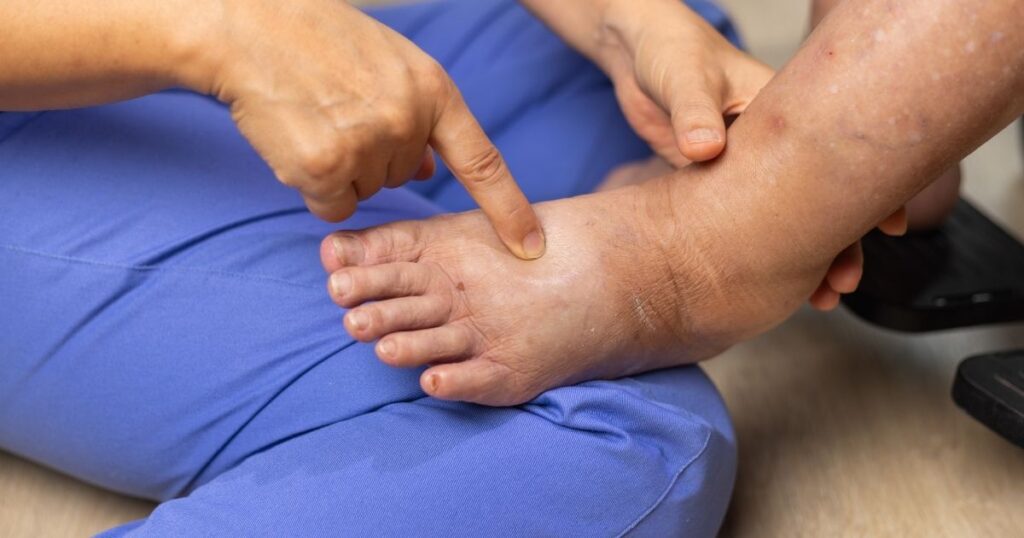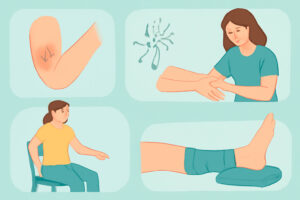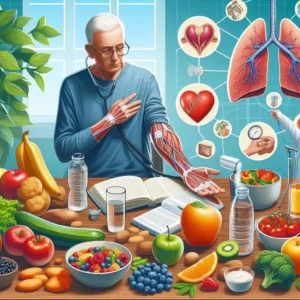Lymphedema is a chronic condition that causes swelling, typically in the limbs, due to a compromised lymphatic system. It can develop after cancer treatments, surgery, or injury. For those living with lymphedema, managing the condition involves more than just controlling swelling. The skin’s health is also critical, as damaged skin is more susceptible to infections. Protecting your skin from infections is essential to prevent complications and maintain a healthy, comfortable lifestyle.
Brief Overview of Lymphedema and Its Impact on Skin Health
When the lymphatic system is damaged, it is unable to drain fluid effectively, which leads to swelling. This can stretch the skin, causing it to become more fragile and prone to injury. Infected skin in a lymphedema-affected area can lead to serious complications, such as cellulitis or lymphangitis. Since the lymphatic system plays a role in fighting infections, having lymphedema makes the body less equipped to combat harmful bacteria, viruses, and fungi. Therefore, maintaining skin health is crucial in managing lymphedema.
Importance of Skin Protection to Prevent Infections
One of the most important aspects of managing lymphedema is keeping your skin safe from cuts, abrasions, and infections. A simple scratch or minor injury can quickly lead to an infection, which might worsen lymphedema and cause additional health complications. The skin acts as the body’s first line of defense against harmful pathogens, and when that barrier is compromised, it can lead to significant issues. Regular care and preventative measures can greatly reduce the risk of infection.
Purpose of the Blog Post: To Provide Practical Tips for Skin Care
This article aims to provide valuable, practical tips for protecting your skin if you have lymphedema. From daily skin care routines to protective measures, we’ll cover a variety of strategies that can help reduce your risk of infections. These guidelines can help you better manage your lymphedema and keep your skin healthy and safe.
Daily Skin Care Routine
A consistent skin care routine is vital for preventing skin infections. Dry, cracked, or irritated skin is more vulnerable to bacteria. Maintaining a clean, moisturized, and healthy skin barrier is the best way to reduce infection risk.
Importance of Keeping the Skin Clean and Moisturized
Lymphedema can cause the skin to become dry and tight, increasing the likelihood of cracks and breaks. Cleaning and moisturizing your skin regularly can help maintain its elasticity and integrity, reducing the risk of infections. Cleansing removes dirt, bacteria, and other impurities, while moisturizing helps lock in hydration, keeping the skin soft and pliable.
Recommended Products for Sensitive Skin
Choosing gentle, non-irritating products is important because skin affected by lymphedema is more sensitive. Look for:
- Hypoallergenic body wash: Free from harsh chemicals, fragrances, and dyes to avoid irritation.
- Fragrance-free moisturizers: Products like hypoallergenic creams, oils, or lotions specifically designed for sensitive skin are ideal. Look for ingredients like shea butter, cocoa butter, or ceramides to help hydrate and protect the skin.
- Antibacterial soap: An antibacterial soap can help cleanse the skin without drying it out, which is particularly important for areas prone to infection.
Avoid products that contain alcohol or artificial fragrances, as these can irritate the skin and worsen dryness.
Tips for Gentle Cleansing and Moisturizing Techniques
When cleansing and moisturizing your skin, follow these tips to avoid further irritation:
- Use lukewarm water: Hot water can dry the skin and increase the risk of irritation. Always cleanse your skin with lukewarm water.
- Pat, don’t rub: Gently pat your skin dry with a soft towel after cleansing. Rubbing can cause microtears in the skin, which increases the risk of infection.
- Apply moisturizer immediately after drying: This helps seal in moisture and prevents the skin from drying out.
Protective Measures to Prevent Infections
While skin care is essential, taking proactive steps to protect your skin from injuries and external irritants is equally important. Preventing injuries like cuts and scrapes is key to reducing the likelihood of infection.
Importance of Wearing Appropriate Clothing and Footwear
Choosing the right clothing and footwear is essential in protecting your skin from harm. Tight or rough fabrics can rub against your skin, leading to abrasions and irritation. Here’s what you should consider:
- Wear loose, soft clothing: Choose breathable, cotton-based clothes that don’t restrict circulation or rub against your skin. Avoid wearing tight jewelry or elastic bands that could cause friction.
- Opt for cushioned shoes: Shoes that offer support and cushioning reduce the risk of blisters or cuts. Choose shoes that fit properly to avoid friction or pinching, especially if lymphedema affects your feet or legs.
If you experience swelling in your limbs, consider compression garments as recommended by your healthcare provider. These garments can provide gentle pressure, helping to control swelling and reduce the likelihood of skin irritation.
Strategies for Avoiding Cuts, Scrapes, and Irritations
Minor cuts or scrapes can lead to serious infections in individuals with lymphedema. Protecting your skin from these injuries is crucial.
- Use protective gear: If engaging in physical activities or working with sharp objects, always wear protective gloves or pads to prevent accidental cuts.
- Be cautious with household chores: Avoid using harsh cleaning products or gardening tools that could cause injury. Always use gloves when handling household chemicals.
- Stay hydrated: Dry, cracked skin is more likely to become damaged. Drink plenty of water and use skin-friendly moisturizers to keep your skin well-hydrated.
The Role of Sun Protection and Avoiding Extreme Temperatures
Exposing your skin to the sun or extreme temperatures can lead to burns, irritation, and damage, which makes it more vulnerable to infection.
- Wear sunscreen: Always apply a broad-spectrum sunscreen with SPF 30 or higher to exposed areas, especially if you’re outside for extended periods.
- Avoid prolonged sun exposure: Try to stay in the shade during peak sunlight hours (10 a.m. to 4 p.m.).
- Keep your skin cool: Excessive heat or cold can irritate the skin and cause it to crack. Wear loose, cool clothing in hot weather and drink plenty of fluids. Protect your skin from wind and cold in cold weather by wearing moisturizing creams and covering exposed areas.
Conclusion
Protecting your skin from infections is a vital part of managing lymphedema. You can greatly reduce the risk of infections by following a consistent skincare routine, wearing the right protective clothing, and avoiding environmental irritants. Proper skin care not only helps prevent complications but also improves your overall quality of life while living with lymphedema. Always consult with your healthcare provider for personalized advice and treatment options tailored to your needs.
FAQs
1. Why is my skin more prone to infections if I have lymphedema?
Lymphedema causes swelling that can stretch and damage the skin, making it more vulnerable to cuts, infections, and other irritations. A compromised lymphatic system makes fighting off infections harder for your body.
2. Can I use regular soap to clean my skin if I have lymphedema?
It’s best to avoid regular soap as it may contain harsh chemicals that can dry out or irritate your skin. Instead, use hypoallergenic, fragrance-free soap designed for sensitive skin.
3. How often should I moisturize my skin if I have lymphedema?
You should moisturize your skin at least twice a day, especially after bathing, to prevent dryness and cracking. Apply moisturizer while your skin is still slightly damp to lock in moisture.
4. How can I protect my skin from the sun if I have lymphedema?
Wear sunscreen with SPF 30 or higher and protective clothing. Avoid direct sunlight during peak hours to prevent skin damage and irritation.
5. Can compression garments help protect my skin from infection?
Compression garments can help reduce swelling and protect your skin by providing gentle, even pressure. Always consult your doctor before using compression garments to ensure they suit your condition.





